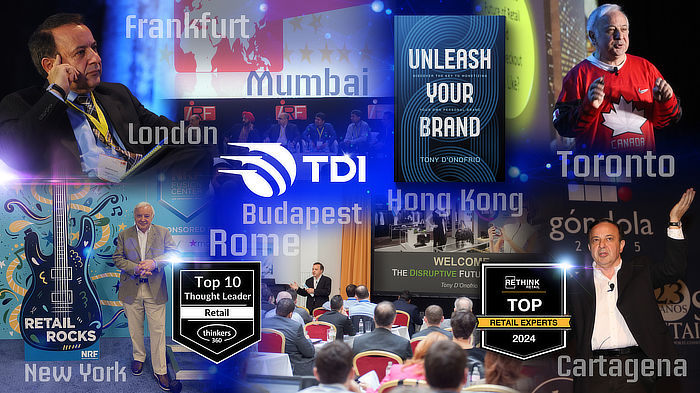VISIONARY / TECHNOLOGY / LEADERSHIP
Top 25 Retail Website / Global Retail Influencer
Technology
Will Apple’s Headset Be as Disruptive as the iPod, iPhone or Apple Watch? | WSJ
- May 17, 2023
Apple is expected to announce a mixed-reality headset in 2023. Thanks to the iPhone, Apple has a massive 2-billion-person installed base, but convincing customers to purchase a pricey headset could be a challenge.
Why Hydrogen-Powered Planes Will Beat Electric Planes -CNBC
- May 12, 2023
Aircraft giant, Airbus, is exploring this new technology, as well as new startups, ZeroAvia and Universal Hydrogen. CNBC explores hydrogen planes and whether they could fix aviation’s emissions problem.
I Challenged My AI Clone to Replace Me for 24 Hours | WSJ
- April 29, 2023
New AI voice and video tools can look and sound like you. But can they fool your family—or bank? WSJ’s Joanna Stern replaced herself with her AI twin for the day and put "her" through a series of challenges.
How to stop AI going rogue -The Economist
- April 25, 2023
Artificial intelligence is improving so fast that no one knows what it might be capable of. It brings huge opportunities, but also huge risks. Arjun Ramani, The Economist's global business and economics correspondent, explains what could go wrong.
How Tap-to-Pay Works | The Tech Behind | WSJ
- April 21, 2023
From Apple iPhones to New York City subway turnstiles, tap-to-pay use in everyday American life is growing, thanks in part to its security and ease of use. But tap-to-pay and its small near field communication antennas are more complicated than they look.
Beyond ChatGPT: what chatbots mean for the future -The Economist
- March 24, 2023
With the arrival of generative AI chatbots, artificial intelligence no longer seems the preserve of science fiction. Now that the bots are talking back, what does it mean for the future of the internet—and our relationship with machines?
The Rise Of Dumb Phones -CNBC
- March 22, 2023
Dumb phones, once considered outdated, are still prevalent around the world, making up about a quarter of mobile phones actively in use. Affordability in developing countries is a significant reason for their continued use.
How eVTOLs Could Disrupt The $49B Helicopter Industry -CNBC
- January 26, 2023
With an estimated 200 companies working on them, electric vertical take-off and landing vehicles are taking the aviation industry by storm.
How TikTok Could Become a U.S. Company | WSJ
- January 24, 2023
TikTok is at a crossroads, as U.S. concerns about its Chinese ownership grow. Some officials have explored the idea of forcing a sale to a U.S. company. WSJ explains the challenges of making that happen.
Will Robots Replace Fast Food Workers? -CNBC
- January 10, 2023
This robot named Flippy runs the fry station at a White Castle outside of Chicago. With a mechanical arm and using computer vision technology Flippy can cook everything from french fries and onion rings to cheese sticks.
How Tech Is Betting Big On AI Generated Art -CNBC
- December 02, 2022
Silicon Valley is abuzz over a new kind of artificial intelligence — generative AI. It's a somewhat new field that exploded in popularity and attention in recent weeks.
How Joby And Delta Are Making Flying Taxis A Reality -CNBC
- November 11, 2022
Advances in battery and electric propulsion technology have enabled entirely new types of aircraft to take to the skies. Startups Joby, Archer, Vertical, Lilium and more are developing eVTOLs, electric vertical take-off and landing aircraft
Self-Driving Tech Companies Aren't Developing Fast Enough | Tech News Briefing Podcast | WSJ
- October 29, 2022
Self-driving cars have advanced quite a bit, but the technology isn't making it onto roads as fast as some executives and investors had predicted.
How AI Art Generators Like Dall-E 2 and DreamStudio Work | WSJ
- October 20, 2022
New text-to-image generators powered by artificial intelligence, including OpenAI Dall-E 2 and Stability AI DreamStudio, let you type in almost any phrase and get an image.
Does Apple’s Crash Detection Work? We Totaled Some Cars to Find Out. | WSJ
- September 30, 2022
Apple’s new iPhone 14 and Apple Watch models can detect severe car crashes and automatically call 911. So can Google Pixel. But does crash detection actually work? WSJ finds out.
The New Data Storage Tech Beyond Hard Drives | Tech News Briefing Podcast | WSJ
- September 16, 2022
We’re storing more of our data than ever, but the hard disk drives we rely on are reaching their physical limits. Now scientists are working on methods to increase capacity and find new ways to house our data.
How Fiber Will Speed Up America’s Internet -CNBC
- September 10, 2022
Fiber connections provide users with very fast, reliable internet. But, only 43% of U.S. households have access to a fiber internet connection.The Bipartisan Infrastructure Law that passed in November 2021 promises to bridge this digital divide.
First Look: Comparing Apple's iPhone 14, 14 Plus, 14 Pro and 14 Pro Max | WSJ
- September 08, 2022
Apple has unveiled four new iPhone 14 models at its annual September event: the iPhone 14, 14 Plus, 14 Pro and 14 Pro Max.
U.S. vs. China: The Race to Build the World’s Fastest Supercomputers | WSJ
- August 31, 2022
The U.S. supercomputer Frontier was crowned the world’s speediest this year, but some computer scientists say China‘s Tianhe-3 may be as fast. WSJ unpacks the tech and design of the machines.
Apple Pay Is Killing the Physical Wallet After Only Eight Years | Tech News Briefing Podcast | WSJ
- August 24, 2022
When Apple launched Apple Pay in 2014, it didn’t seem like the contactless payment system was much of a hit with customers. Flash forward eight years and the iPhone maker has convinced millions to make their smartphones their wallets.
Page 2 of 20


Top 3 Weekly Essentials

It is a Small World
Continuing to learn something new, we travel to Florence Italy. It is not just the birthplace of the Renaissance, but also the place where the piano, opera, and gelato were invented.
America is named after the Florentine Amerigo Vespucci. The story of Pinocchio was written in this city. The famous luxury fashion brand Gucci was founded Florence by Guccio Gucci in 1921 and you can still visit the first store located here. It’s also where you will find the world’s oldest pharmacy established in 1221.
Florence’s cathedral, Santa Marie del Fiori or Il Duomo, is the 11th largest church in the world, was built with over 4 million bricks and took 140 years to complete Michaelangelo’s statue of David was created between 1501 and 1504.
Dante Alighieri, the father of the Italian language, wrote “The Divine Comedy” in a Florentine dialect that eventually evolved into modern Italian. The city is also credited with establishing one of the first medical schools in Europe, the University of Florence School of Medicine.
In a 2017 personal article titled “Reflective Moments that Change your Life,” I reflected on the Florence experiences of three quintessential Renaissance men. The biographies of Leonardo da Vinci, Michelangelo, and Galileo clearly illustrate, there is no perfect life. As humans we all make mistakes and fail at times. How we react and where we go next is totally up to each of us. What we think about, we will become.
You are not alone. Focus on the possible, ignore the impossible, for the glass is always half full. Be endlessly curious. Find your special place (as I did when I wrote 2017 Florence article) and have that quiet conversation with history to build an amazing fulfilling successful life.
Categories

Brilliant Research
Uncharted Territory: Global Economic Outlook 2025-2027 - 1H 2025
A decline to 2.3% global output growth is anticipated for this year and next, followed by a modest rebound to 2.9% in 2027. Our latest projections suggest 2025–2027 average growth of 2.5%, marking a decline from the 2.8% projected in January. - From Kearney Read more

Smart Infographic
The Highest Paying Industries in the United States (2025)
Insightful Videos
China Coffee Wars — Why Starbucks Is Losing The Battle With Luckin -CNBC
Despite adding around 1,500 new stores between 2022 and 2024, Starbucks’ revenue hasn't increased. Competition from chains like Luckin, Cotti and Manner have increased sharply in the years following the pandemic. Read more
As applicable, all trademarks, service marks, and content in Top 3 Weekly Essentials, Brilliant Research, Smart Infographic, and Insightful Videos published on this site are the property of their respective owners.
Copyright © 2025 TD Insights LLC. All Rights Reserved.
Privacy Policy Cookie Policy











